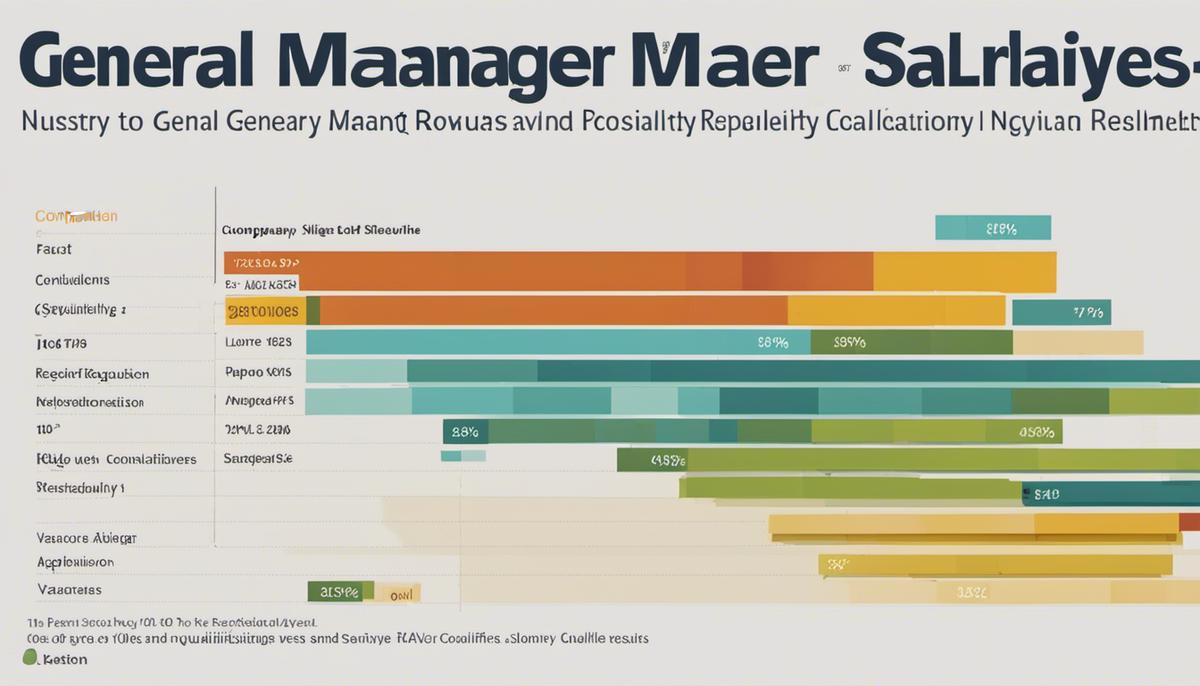In the business world, the role of a general manager is both significant and multifaceted, impacting the functionality and profitability of an organization on numerous levels. Yet, many are unaware of the pecuniary aspects of this crucial position. In this informative stance, we delve into the quantifiable remuneration of general managers, covering the average salary they earn across different industries and geographic locations, and how factors like company size, responsibilities, qualifications, and skills influence these variations. Furthermore, we explore the additional compensations and perks that come with this role, playing a substantial part in their comprehensive earnings.
How Much Does a General Manager Make
Average Salary of a General Manager
General managers are vital to the success of a business, having a hand in nearly all aspects of operation. According to the U.S. Bureau of Labor Statistics, the median annual wage for general and operations managers as of May 2020 was $103,650. However, this figure can vary dramatically based on a range of factors, including the industry, geographic location, and length of experience.
Salary Variation by Industry
Different industries offer different compensation packages for their general managers. For instance, the retail sector’s median annual wage for these managers is roughly $73,190, while those working in finance and insurance industries earn significantly higher, with a median wage of $142,500. Furthermore, general managers in the information sector can expect a median wage of $166,140, further illustrating the significant industry-based difference in pay.
Geographic Impact on General Manager Salary
Geographic location is another key determinant of a general manager’s salary. For example, general managers working in metropolitan areas such as New York, San Francisco, and Washington, D.C. tend to earn substantially more than their counterparts in less urbanized regions. These differences are typically attributable to the cost of living, with higher salaries offsetting the elevated costs associated with living in city centers.
Experience and Salary
Length of experience also significantly impacts a general manager’s salary. For example, a general manager with less than a year’s experience might expect a median annual wage of approximately $52,000. In contrast, individuals with 10-19 years of experience can expect a median income of approximately $88,000 annually. Those with over 20 years of experience in the role could see their median annual income rise to around $100,000.
Understanding Salary Determinants for a General Manager
Various aspects contribute to the salary determination of a general manager. The scale of the company is a crucial determinant — larger organizations usually offer a more substantial pay scale primarily due to a more wide-ranging operational role. In conjunction, the degree of responsibilities, which can fluctuate among various general managers, also plays a role in deciding the salary scale.
The credentials and special competencies necessary for the position also play a part in this pay variation. For instance, a general manager with an MBA or equivalent qualification may expect a higher pay scale than those with just a bachelor’s degree. Professionals with skills such as strategic planning, leadership prowess, and experience managing sizable budgets may also anticipate a higher income. As with most positions, professionals who bring more to the organization can usually expect a higher return in pay.

Role and Responsibilities of a General Manager
An Overview of the Role and Responsibilities of a General Manager
A General Manager, often referred to as a GM, usually holds the comprehensive role of managing a business unit or an entire organization. The role generally entails overseeing business operations, formulating strategies to enhance and steer business activities, and leading various teams. The key duties of a GM often encompass the creation and execution of business strategies, managing financial performance and budgeting, ensuring customer satisfaction, and staying compliant with regulations.
In sectors such as hospitality, the GM typically also handles maintaining seamless daily operations, ensuring outstanding customer service, and dealing with any customer issues or queries. On the other hand, within manufacturing or industrial sectors, the role of the GM could be more concentrated on improving production efficiency, managing supply chain processes, and upholding health and safety regulations.
Factors Influencing a General Manager’s Salary
A range of factors can impact the total remuneration of a GM. The primary factor is the industry in which they operate. For example, GMs in the technology or finance sectors tend to earn more than those in the retail or hospitality sectors. Another instrumental factor is the size and profitability of the organization – larger and more profitable organizations generally have the capacity to pay higher salaries.
Geography will also affect a GM’s salary, as the cost of living varies by location. Expect higher salaries in major cities and industry hubs compared to smaller cities or rural areas. Experience, education, and specialized skills are additional factors. A GM with many years of experience, advanced degrees, or specialized skills can command a better salary package than someone with less experience or education.
Overview of a General Manager’s Salary
As per the data from the U.S Bureau of Labor Statistics, as of May 2020, the median yearly salary of general and operations managers was approximately $100,780. However, earnings can vary greatly. The lower 10 percent reported profits less than $45,470, while the top 10 percent surpassed $208,000 in earnings. In specialized fields such as professional, scientific, and technical services, the median yearly wage was considerably higher at $150,120.
The compensation package for a General Manager usually extends beyond a basic salary. Added benefits may include bonuses, profit sharing, shares, health insurance, pensions, among others. Thus, when examining a GM’s salary, it’s critical to consider the complete payment package and not solely the base salary.

Extra Compensation and Benefits for General Managers
Breakdown of a General Manager’s Compensation Package
General managers receive a fixed annual salary, but their total compensation includes various other components which significantly boost their overall income. This broader compensation package usually incorporates elements such as bonuses, profit-sharing, and company stocks. Additionally, benefits such as health insurance and retirement plans may also be part of their package, making their total earnings much more substantial.
Bonuses
Many companies offer yearly bonuses to their general managers as an incentive for meeting or exceeding business goals and targets. These bonuses might be based on factors such as company performance, individual performance, or a combination of both. Bonus amounts can vary widely, depending on the organization’s size and profitability. For example, a General Manager might earn a bonus that’s a percentage of their base salary — anywhere from 10% to 50% or more.
Profit Sharing
Profit sharing is another form of incentive compensation offered to general managers. This involves the company allocating a portion of its annual profits to its employees, based on their performance. Like with bonuses, profit sharing plans can add a significant amount to a general manager’s total yearly pay.
Share Options
Shares or equity in the company can also be a significant part of a general manager’s compensation package. These shares give the general manager a partial ownership stake in the company. This proportionate ownership usually comes with voting rights in company decisions. Not only is this an incentive for the manager to improve the company’s financial performance, but it also provides the potential for large financial gains if the company’s stock appreciates in value.
Other Benefits
Outside of monetary compensation, general managers often receive additional benefits. These can include comprehensive healthcare coverage, retirement contributions, paid time off, and, in some cases, use of a company vehicle or membership to exclusive clubs or organizations, all of which contribute to the overall compensation package. These benefits, while not directly enhancing a manager’s take-home pay, provide additional value that improves their overall compensation package and lifestyle.
Determining the Total Compensation Package
When considering the total compensation for a general manager, it’s critical to look not just at the base salary, but also these additional forms of compensation. Bonuses, profit-sharing payouts, share options, and other benefits can significantly bolster a general manager’s earning capacity, potentially doubling or even tripling their base salary in some cases. The value of these extras contributes significantly to the overall earning package of the General Manager and varies greatly depending on company size, the manager’s experience, and industry norms.

Indeed, the financial aspect of a general manager’s role extends beyond the baseline salary, incorporating bonus schemes, profit sharing, shares, and many other benefits. These extra compensations, coupled with the base salary, can significantly boost a general manager’s total annual earnings. Thus, the multi-faceted profession of a general manager justifies the diverse remuneration they receive, both in terms of direct salary and indirect benefits. The role is vast and varied, and similarly the compensation is complex and multi-dimensional. Ultimately, it is a balance of responsibility, qualifications, skills, and experience that determines the true value of a general manager.

